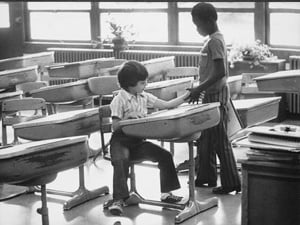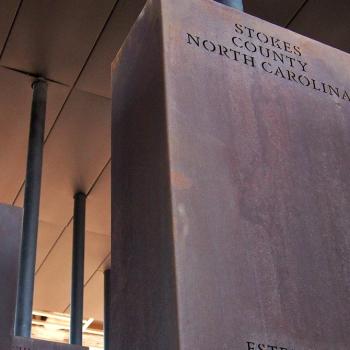 Recently, after I’d just watched the documentary about food deserts called A Place at the Table, I was being taxi dad, driving kids around town. I discovered that a kid I know and see relatively often is not only poor, but experiences every day what is now euphemistically called “food insecurity.” Also, not incidentally, the kid is African American.
Recently, after I’d just watched the documentary about food deserts called A Place at the Table, I was being taxi dad, driving kids around town. I discovered that a kid I know and see relatively often is not only poor, but experiences every day what is now euphemistically called “food insecurity.” Also, not incidentally, the kid is African American.
All three of my kids are musicians, the circles in which they move at school are integrated, and they have formed close friendships with their black peers. It is heartening to see what appears to be Martin Luther King Jr.’s dream of “little black boys and black girls…able to join hands with little white boys and white girls as sisters and brothers.”
Outside of school however, things can get awkward fast. The disparity is undeniable—even if it is uncomfortable to talk about. These kids are on a path that will likely split along racial lines as they grow into adulthood. Not only is it not likely they will remain friends, it is not likely that their life trajectories will be anything alike.
First, in this group of close friends the line between the haves and the have-nots is drawn on racial lines. Second, while they are reaching an age at which they are noticing and showing discomfort with these inequalities, they are also encoding poisonous systemic notions about race, wealth, merit, and opportunity.
Take opportunity: My children do not have limitless opportunities—we live on teachers’ salaries—but their family and social situations have placed them on a springboard that, if they choose to use it, will launch them into success. They will have to work hard, sure, but the chances that their work will pay off with a comfortable life are a foregone conclusion. For their friends on the other side of the racial divide, not so. Where my kids find a springboard, they often find a fence. And behind that a wall.
This is where I begin to get push back from many white people I know. Because they do not want to be labeled with the R word, they discuss this issue carefully. Why do I hesitate even now to use the word, when racism—individual, institutional, and systemic—is a massive and undeniable problem?
What I inevitably get is some variation of two defensive responses: They say to me, “You are the one who is racist, because you think black people need handouts, can’t be successful on their own merit.” They also say, “It is not fair to take away what I have earned fair and square and give it to someone else who will not work for it.”
The root assumption of both these claims is that most everyone starts with a similar array of opportunities, and some have squandered theirs, or at least not worked quite hard enough. This is simply not the case. In his excellent essay “The Case for Reparations” Ta-Nehisi Coates gets to the point. He writes, that, “America was built on the preferential treatment of white people—395 years of it.”
It is not ancient history either. We live in an America, “in which black college graduates still suffer higher unemployment rates than white college graduates, and black job applicants without criminal records enjoy roughly the same chance of getting hired as white applicants with criminal records.”
An interesting study was done with the board game Monopoly. Volunteers played the game, but with changed rules. One player was given $2000 at the beginning, $200 at each pass of Go, and allowed to roll two dice; the other player was given $1000 to start with, $100 at each pass of Go, and was allowed only one die for each roll.
“Initially, [the advantaged player] reacted to the inequality between him and his opponent with a series of smirks, an acknowledgment, perhaps, of the inherent awkwardness of the situation.” As the game progressed, he became more assertive, then cocky, picking up the poor player’s elf shoe and moving it for him, even engaging in some lighthearted taunting. “As the game nears its finish, [the advantaged player] moves his Rolls faster. The taunting is over now: He’s all efficiency. He refuses to meet [the disadvantaged player’s] gaze. His expression is stone cold as he takes the loser’s cash.” He comes to believe it is his own acumen that has given him the win. He deserves it more than the disadvantaged player.
What I am talking about here is racial inequality, not simply a problem of rich and poor and the opportunities allotted to each. It is a mistake to conflate the two issues. This is what Mr. Coates calls our “particular history of white-imposed black disadvantage,” and many white Christians are implicated along with everyone else. It doesn’t help to try to gloss over this.
I do not want my children growing away from their black friends, but I fear it will happen. I do not want them to grow into the advantaged Monopoly players who will someday run into these childhood friends and assume they are better off because they have worked harder and smarter. I do not want their friends, bright, beautiful, and amazingly talented kids, to learn that they must circumscribe their dreams as experience is teaching them every day of their lives right now to do.
As I look at these kids, I am at a loss: what can be done to right this wrong? I know Mr. Coates is right when he writes, “Vaguely endorsing a cuddly, feel-good diversity does very little to redress this.” His sights are set for something more: “What I’m talking about is a national reckoning that would lead to spiritual renewal.”
Vic Sizemore earned his MFA in fiction from Seattle Pacific University in 2009. His short stories are published or forthcoming in StoryQuarterly, Southern Humanities Review, Connecticut Review, Portland Review, Blue Mesa Review, Sou’wester, Silk Road Review, Atticus Review, PANK Magazine Fiction Fix, Vol.1 Brooklyn, Conclave, and elsewhere. Excerpts from his novel The Calling are published in Connecticut Review, Portland Review, Prick of the Spindle, Burrow Press Review, Rock & Sling, and Relief. His fiction has won the New Millennium Writings Award for Fiction, and been nominated for Best American Nonrequired Reading and a Pushcart Prize. You can find Vic at http://vicsizemore.wordpress.com/.











